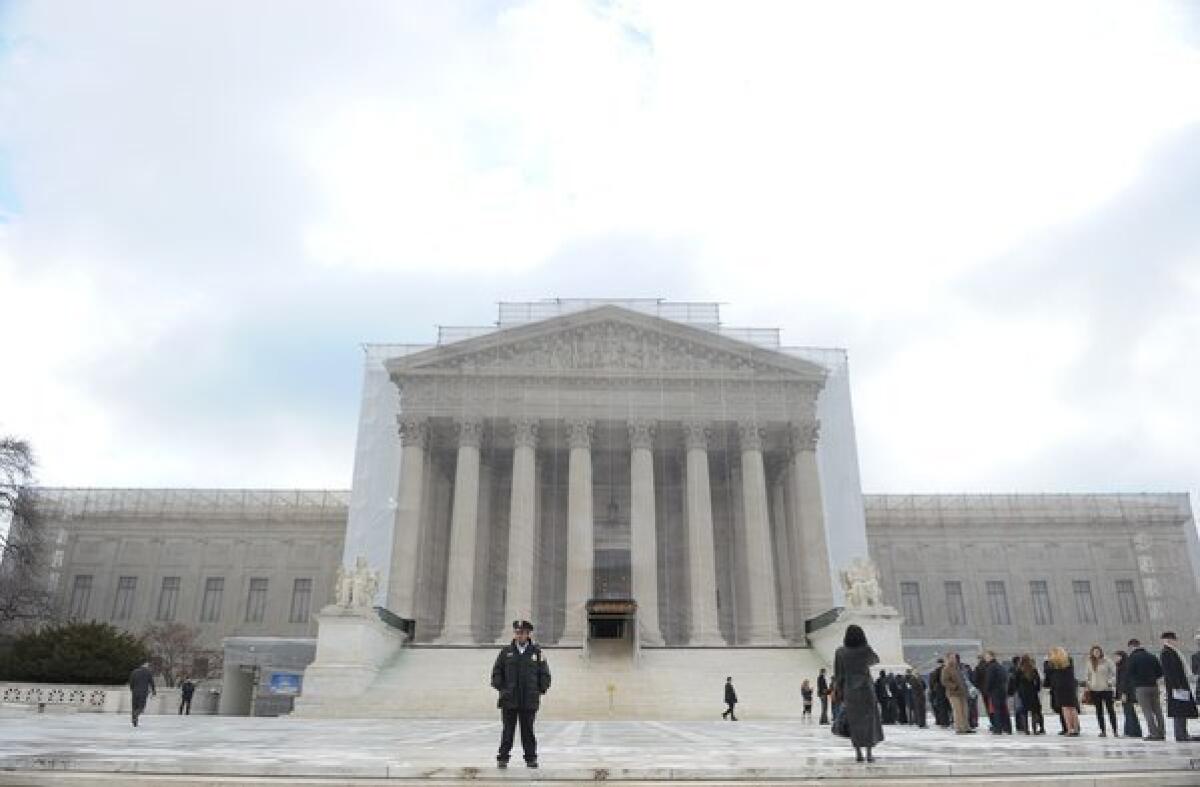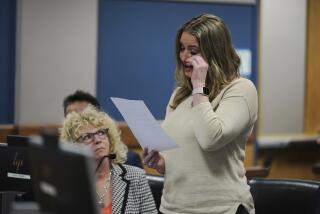Violating the right to a lawyer

- Share via
In a Georgia courtroom last year, a poor, 17-year-old high school freshman, charged as an adult with stealing a go-cart, entered a guilty plea to a felony charge of theft. It was his first time in court, and he was startled and confused when the judge asked if he was satisfied with his lawyer. “I don’t have one,” he answered. He had not spoken to a lawyer. A public defender’s investigator had told him what the charges against him were and suggested he plead guilty. A public defender quickly spoke up and asserted that he was representing the youth. The judge accepted the guilty plea, imposed a sentence of probation, restitution, fines and a $50 public defender fee.
In the same courtroom that day, other people who pleaded guilty had spoken to a lawyer for only three to five minutes before entering a plea and being sentenced. Still others pleaded guilty after speaking to only a prosecutor, without even consulting with a defense lawyer.
Guilty pleas account for about 95% of all criminal convictions. In many courts, poor people are processed through the courts without lawyers or moments after speaking for a few minutes with lawyers they just met and will never see again. This is called “meet ‘em and plead ‘em” or “McJustice.”
Fifty years ago this week, one of the Supreme Court’s most celebrated cases, Gideon vs. Wainwright, established the right of criminal defendants to have a lawyer. The cases above are stark examples of how that right is violated every day across the nation.
A 2004 American Bar Assn. study reached “the disturbing conclusion that thousands of persons are processed through America’s courts every year either with no lawyer at all or with a lawyer who does not have the time, resources or, in some cases, the inclination to provide effective representation.” Since that study, the number of cases has increased, but the number of available lawyers has not.
Many poor people are detained in jails after arrest without lawyers for weeks or months. This may cause them to lose their jobs and homes, even if they are eventually not convicted of anything. Even when there is some representation for the poor, the lawyers are often struggling to handle more cases than is humanly possible.
Most states, which are responsible for more than 95% of all criminal prosecutions, have treated the Gideon decision as an unfunded mandate to be resisted. They have little incentive to provide competent lawyers to represent the people they are trying to convict, fine, imprison or execute. Many focus on minimizing costs, awarding the defense of poor people to the lowest bidder, compensating lawyers at meager rates and underfunding public defender programs. This facilitates pleas, speeds up cases and heightens the chances of conviction for anyone accused of a crime.
The cost of disregarding the right to a lawyer is enormous. Innocent people are convicted while the perpetrators remain at large. Important issues, such as the system’s pervasive racism, are ignored. A justice system in which the key actors routinely ignore one of its most fundamental constitutional requirements lacks legitimacy and credibility.
Several things must be done to comply with the constitutional right to counsel and ensure fairness. Adequate funding is essential. One example of what states can accomplish with adequate funding is Colorado’s statewide defender system, in which lawyers are thoroughly trained and supervised and have reasonable workloads and access to investigators, interpreters, social workers and experts.
Courts must enforce the right to counsel instead of being complicit in its denial. Trial judges must stop orchestrating “meet ‘em and plead ‘em” processing of people, which involves little or no legal representation. Courts must be responsive to lawsuits challenging deficiencies in representation.
Prosecutors — the most powerful actors in the system — should not exploit the poor quality of defense representation as a strategy for winning cases, as some do. They should instead support efforts to improve it, as Atty. Gen. Eric H. Holder Jr. has done by pointing out the deficiencies in representation and urging reforms.
Finally, the legal profession, the media, law professors, law students and others must hold the system up to public examination until both the spirit and letter of the law in the Gideon ruling is upheld.
People facing the loss of life or liberty are entitled to more than McJustice.
Stephen B. Bright teaches at Yale Law School and is president and senior Counsel of the Southern Center for Human Rights in Atlanta. Sia Sanneh is a senior fellow at Yale Law School and an attorney with the Equal Justice Initiative in Alabama.
More to Read
A cure for the common opinion
Get thought-provoking perspectives with our weekly newsletter.
You may occasionally receive promotional content from the Los Angeles Times.










